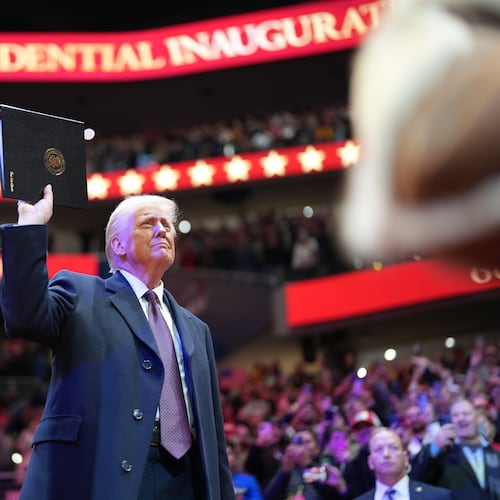Georgia Secretary of State Brad Raffensperger has repeatedly said there was no widespread fraud in the November election. But last week the Republican came out in support of a new review of absentee ballots in Fulton County.
On Thursday, Raffensperger spoke with The Atlanta Journal-Constitution about the review and the lawsuit that produced it. Below are excerpts from that interview, edited for length and clarity.
Q: Your office investigated election problems in Fulton County. Did you find fraud?
A: We did not find any widespread absentee ballot fraud or election fraud in Fulton County, period. In fact, we had a monitor at Fulton County and he produced a report. What our monitor said is he did not find any illegality or ballot stuffing. What he did see is mismanagement. The challenge with mismanagement is that it creates lack of confidence whenever you’re having these election issues, particularly when one side is disappointed in the results.
RELATED: Ballot inspection seeks elusive proof of fraud in Georgia election
Q: So, if there was no fraud, what’s the value of this review?
A: At the end of the day, I believe if you have the right levels of accessibility with transparency and the right procedures in place, and you make sure you have the oversight of this process, then you’re going to get results very similar to what we got in November. We did a 100% hand recount, a hand audit. Every single absentee ballot was counted again. Every single early vote was counted again. And every single day-of-election ballot was counted. Every single one of those ballots, all 5 million, have been recounted by hand. And we got virtually the same result. So hopefully, this puts it to bed.
… We have a paper ballot, which allows us to do these recounts. And that’s a good thing. Because, at the end of the day, when it’s recounted and you keep recounting and you keep getting the same results, this should put it to rest. And then we can move forward.
Q: Some folks are concerned these efforts in Georgia and elsewhere are only sowing more doubt, not satisfying anyone who thought there was fraud. Are you concerned even this won’t be enough to address those doubts?
A: If you want to go back in time, in the 2018 race, when Gov. (Brian) Kemp won by more than 50,000 votes, Stacey Abrams did not concede, and she gave all of her reasons why she could not concede. She was creating doubt and building mistrust in the election process on her side of the aisle. Back in 2016, when President (Donald) Trump won, then Hillary Clinton’s camp talked about Russian collusion and tried to cast aspersions on his victory. … Then we do an election that was very tough and very tight, and my side was disappointed. I’m a Republican. I understand the disappointment on my side. We verified the results. We had the first run of what the total was. Then we did a 100% hand retally of all 5 million ballots. Then we ran those ballots again through the scanner. All three times the results were very similar.
Now our job is to rebuild confidence where we can. But candidates need to get to the point where, when they lose elections, they need to accept the will of the people.
Q: There’s some concern that this could turn into a situation like Arizona’s review, which has drawn bipartisan condemnation. Should Georgians be concerned about that happening here?
A: I would assume the judge wants to make sure the appropriate procedures are put in place, so we have appropriate guardrails and we also know where the path will take us based on procedures. Once you set your procedures in place, you follow them. Then, if they want to have oversight, I would welcome groups like the Baker Institute, which is a right-leaning organization, and also the Carter Center. Both of them got together — former U.S. Secretary of State (James) Baker and former President Jimmy Carter — in the Carter-Baker Commission back in 2005, about election reform. And they proposed several ideas. They’re both very involved in the election process. They would give you some nonpartisan, bipartisan oversight of this process, to make sure that both sides feel like they’ve been heard and there’s also the appropriate guardrails in place.
About the Author
The Latest
Featured



